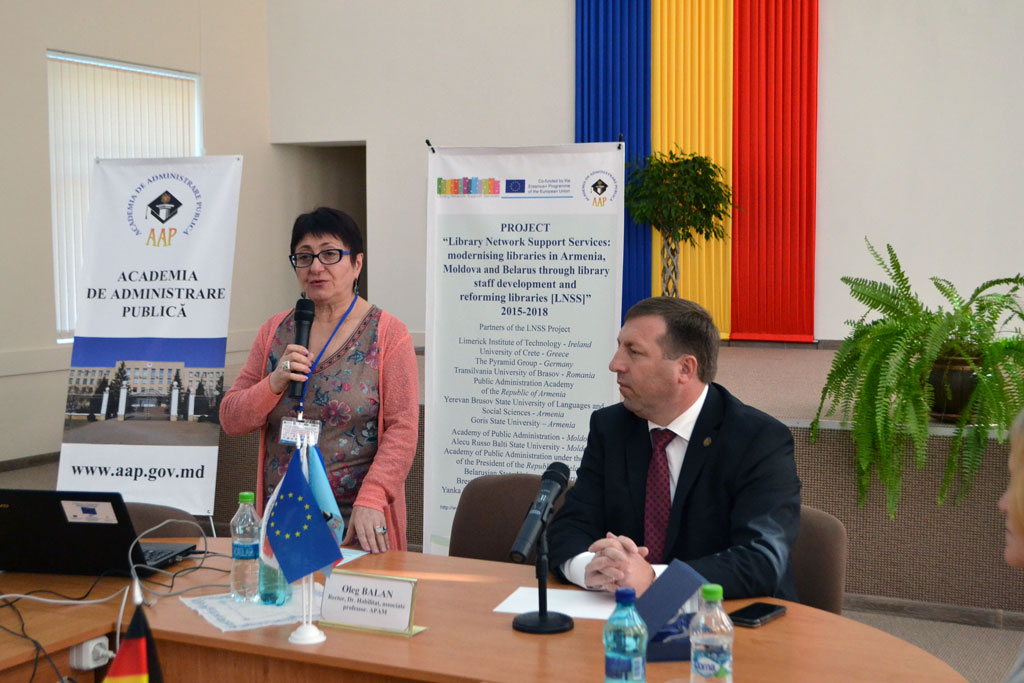Read below about management of the LNSS project.
The Public Administration Academy of the Republic of Armenia (PAARA) has undertaken activities to ensure sound management of the project and performed the duties of authorizing officer and coordinator of the project. With its significant experience in the Library and Information Science field LIT focused in partnership with EU and PC’s on developing the Library Staff Development Strategy for the project- design and implementation of the LNSS modular curriculum in partnership with Armenia, Moldova and Belarus partners and led the Development WP. UTBV led the Preparation WP- Strategic Review, Competency mapping but also contributed to the development of the LNSS Curriculum + training implementation and focused particularly on drafting and delivering in consultation with EU and PC institutions the Consortium Strategic Plan for the project for effective future development of libraries.

UOC also participated and contributed to the design and implementation of the LNSS modular curriculum + training implementation and had specific responsibility for and led the needs analysis regarding Electronic Library Services and championed and developed the Digital and Electronic Strategy for the enhancement of Electronic library services. UOC led a comprehensive Library Collection Development Policy for each PC Institution. UOC have significant experience of leading Quality Assurance from previous Tempus projects (e.g. project 517117) and hence led the Quality Assurance WP. With their significant experience of designing quality Staff Development programs specifically the development of modular curricula, TPG worked closely with LIT to steer and guide the Development of the Library Staff Development Programs that formed the LNSS Curriculum and participated along with EU partners in the delivery of the curricula in LNSS Curriculum Training, piloting, and evaluation of piloting. TPG designed and maintained the project online platform- along with PAARA they led the Dissemination and Exploitation WP and were involved in evaluating the piloting and implementation of the modules and offered advice around: Quality Assurance, ECTS and Bologna compliance.
TPG’s role in the development of the LNSS Curriculum involved providing advice and support around ECTS, the printed handbook of Library HR materials, and providing quality assurance and editing for the major publications in the project – the Collection Development Policy, Consortium Strategic Plan, Digital and Electronic Library Strategy including publications processes. Owing to significant previous project experience from other projects in the Special Needs area TPG along with LIT and PAARA led and drove initiatives to ensure democratization of libraries for people with Special Needs.
EU partners also implemented the English for Specific Purposes (Libraries and Library Terminology) training in the project as well as LNSS Curriculum Training.
PC institutions in Armenia, Moldova and Belarus were involved in the design, pilot, evaluation, accreditation and dissemination of the LNSS project and LNSS Curriculum. They promoted the LNSS project in their universities, cities, regionally and worked together and disseminated at national level. PC’s role in the project increased the level of competence in the field of Library and Information Science specialization. They enhanced adaptation of International Library Standards for future generations and a vital role of PC institutions was, in particular, supported by PAARA as Coordinator and EU partners regarding practical aspects of the project – the creation of roles in each PC institution – the Library Access Liaison Librarian position, Subject Liaison Librarian and each PC institution participated in the all-party LNSS Library Action Group and Project Management Committee (PMC).
